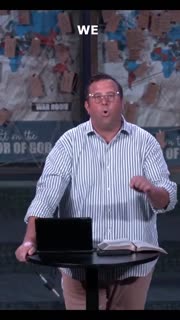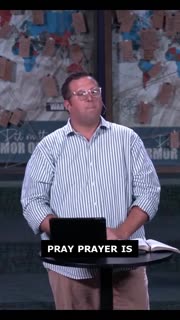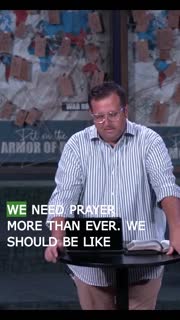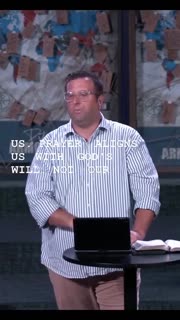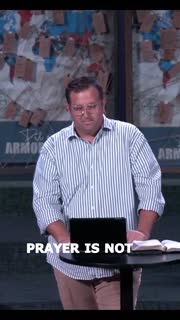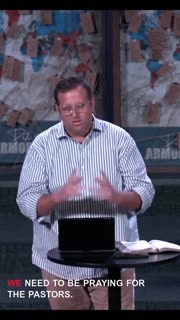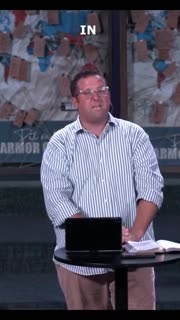Prayer: Our Spiritual Battleground and First Line of Defense
Summary
### Summary
Today, we embark on a new series focused on the essence of prayer, exploring how it serves as our spiritual battleground. Reflecting on personal experiences, including the trials my family and I have faced, I emphasize the importance of turning to prayer in times of overwhelming challenges. Just as Nehemiah wept and prayed upon hearing the devastating news about Jerusalem, we too must turn to God with heavy hearts, seeking His guidance and strength.
Nehemiah 1:4-7 serves as our key text, illustrating that prayer grants us direct access to God and aligns us with His will. Despite the various personal needs we often bring to prayer, true prayer is about seeking God's will rather than our own. Nehemiah's response to Jerusalem's plight teaches us that prayer should be a two-way conversation with God, focusing on His agenda rather than our personal desires.
In our current context, much like Nehemiah's time, we see our nation and communities drifting away from God. This should drive us to our knees in prayer, seeking God's intervention and guidance. Prayer is not a last resort but our first line of defense, a direct line to God who hears each of our prayers individually.
As a church, we must support one another in prayer, especially during times of personal and communal struggles. We should be weeping and praying for our nation, our families, and our church, asking God to draw us closer to Him. By shifting our focus from ourselves to God, we align our lives with His divine plan, experiencing His presence and guidance more profoundly.
### Key Takeaways
1. Prayer as Access to God: Prayer provides us with direct access to God, allowing us to communicate with Him personally. Nehemiah's immediate turn to prayer upon hearing about Jerusalem's fallen walls exemplifies this. We must utilize this access to draw closer to God, making prayer a daily discipline that brings us nearer to Him and further from worldly distractions. [18:08]
2. Aligning with God's Will: True prayer aligns us with God's will rather than our own. Nehemiah's prayer focused on God's agenda, not his personal desires. This teaches us that prayer should not be about presenting a list of requests but about seeking God's will and aligning our lives with His divine plan. [20:10]
3. Communal and Personal Prayer: As a church, we must support each other in prayer, especially during times of struggle. Nehemiah's concern for Jerusalem's people reflects our need to pray for our community, nation, and families. We should be weeping and praying together, seeking God's intervention and guidance. [22:54]
4. Prayer as a First Resort: Prayer should be our first line of defense, not a last resort. Just as Nehemiah turned to God immediately, we must prioritize prayer in our lives, recognizing that God hears each of our prayers individually. This direct line to God is always available, and we should use it to seek His guidance and strength. [24:00]
5. Shifting Focus in Prayer: Our prayers should shift the focus from ourselves to God. Nehemiah's prayer was centered on God's will and the needs of the people, not his personal desires. By making God the main character of our prayers, we align ourselves with His divine plan and experience His presence more profoundly. [29:18]
### YouTube Chapters
[0:00] - Welcome
[01:23] - Introduction to the Series on Prayer
[02:02] - Personal Reflections and Family Challenges
[03:52] - Overcoming Trials Through Prayer
[05:12] - Nehemiah's Response to Devastating News
[08:51] - Key Text: Nehemiah 1:4-7
[10:00] - What is Prayer?
[12:43] - Survey on Prayer Habits
[14:27] - Nehemiah's Weeping and Praying
[16:22] - Jerusalem's Condition and Our Nation
[18:08] - Prayer Gives Us Access to God
[20:10] - Aligning with God's Will
[22:54] - Communal and Personal Prayer
[24:00] - Prayer as a First Resort
[26:14] - Shifting Focus in Prayer
[29:18] - Nehemiah's Prayer and Our Agenda
[32:50] - Humpty Dumpty and Brokenness
[34:56] - Seeking God with All Our Heart
[35:55] - Becoming More Like Nehemiah
[37:50] - Call to Prayer and Response
Study Guide
### Bible Reading
- Nehemiah 1:4-7
### Observation Questions
1. What was Nehemiah's immediate reaction upon hearing the news about Jerusalem's fallen walls? ([08:51])
2. According to the sermon, what does prayer provide us with in terms of our relationship with God? ([18:08])
3. How did Nehemiah's prayer reflect his concern for Jerusalem and its people? ([14:27])
4. What are some of the personal challenges the pastor shared that led him and his family to deeper prayer? ([02:02])
### Interpretation Questions
1. Why is it significant that Nehemiah turned to prayer immediately after hearing the devastating news about Jerusalem? ([08:51])
2. How does the sermon suggest that prayer aligns us with God's will rather than our own desires? ([20:10])
3. In what ways does communal prayer support individuals and the church during times of struggle, according to the sermon? ([22:54])
4. How does the pastor's personal story of trials and prayer illustrate the importance of making prayer a first resort? ([24:00])
### Application Questions
1. Reflect on a time when you faced overwhelming challenges. How did you respond, and how might turning to prayer have changed your experience? ([08:51])
2. How can you make prayer a daily discipline in your life to draw closer to God and away from worldly distractions? ([18:08])
3. Think about your current prayer habits. Are they more focused on personal requests or seeking God's will? How can you shift your focus to align more with God's agenda? ([20:10])
4. In what ways can you support others in your church community through prayer, especially during their times of struggle? ([22:54])
5. How can you prioritize prayer as your first line of defense in your daily life, rather than a last resort? ([24:00])
6. Identify a specific area in your life where you need to shift the focus of your prayers from yourself to God. What steps will you take to make this change? ([29:18])
7. How can you encourage your family or small group to pray together for your community, nation, and church, following Nehemiah's example? ([22:54])
Devotional
Day 1: Direct Access to God Through Prayer
Prayer provides us with direct access to God, allowing us to communicate with Him personally. Nehemiah's immediate turn to prayer upon hearing about Jerusalem's fallen walls exemplifies this. We must utilize this access to draw closer to God, making prayer a daily discipline that brings us nearer to Him and further from worldly distractions. Nehemiah's response to the devastating news about Jerusalem was to weep and pray, showing us that in times of overwhelming challenges, our first response should be to turn to God. This direct line to God is always available, and we should use it to seek His guidance and strength. [18:08]
Nehemiah 1:4-5 (ESV): "As soon as I heard these words I sat down and wept and mourned for days, and I continued fasting and praying before the God of heaven. And I said, 'O Lord God of heaven, the great and awesome God who keeps covenant and steadfast love with those who love him and keep his commandments.'"
Reflection: Think of a recent challenge you faced. Did you turn to God in prayer immediately? How can you make prayer your first response in future challenges?
Day 2: Aligning Our Prayers with God's Will
True prayer aligns us with God's will rather than our own. Nehemiah's prayer focused on God's agenda, not his personal desires. This teaches us that prayer should not be about presenting a list of requests but about seeking God's will and aligning our lives with His divine plan. When we pray, we should ask God to reveal His will to us and help us to align our desires with His. This shift in focus from our own needs to God's will allows us to experience His presence and guidance more profoundly. [20:10]
1 John 5:14-15 (ESV): "And this is the confidence that we have toward him, that if we ask anything according to his will he hears us. And if we know that he hears us in whatever we ask, we know that we have the requests that we have asked of him."
Reflection: Reflect on your recent prayers. Are they more focused on your personal desires or on seeking God's will? How can you shift your focus to align more with God's agenda?
Day 3: Supporting Each Other in Prayer
As a church, we must support each other in prayer, especially during times of struggle. Nehemiah's concern for Jerusalem's people reflects our need to pray for our community, nation, and families. We should be weeping and praying together, seeking God's intervention and guidance. By praying for one another, we strengthen our communal bonds and invite God's presence into our collective struggles. This communal prayer is a powerful tool for spiritual growth and unity within the church. [22:54]
James 5:16 (ESV): "Therefore, confess your sins to one another and pray for one another, that you may be healed. The prayer of a righteous person has great power as it is working."
Reflection: Think of someone in your church or community who is struggling. How can you support them in prayer today? Can you reach out to them and let them know you are praying for them?
Day 4: Prayer as Our First Line of Defense
Prayer should be our first line of defense, not a last resort. Just as Nehemiah turned to God immediately, we must prioritize prayer in our lives, recognizing that God hears each of our prayers individually. This direct line to God is always available, and we should use it to seek His guidance and strength. By making prayer our first response, we demonstrate our trust in God's sovereignty and His ability to intervene in our circumstances. [24:00]
Psalm 34:17 (ESV): "When the righteous cry for help, the Lord hears and delivers them out of all their troubles."
Reflection: Consider a situation where you typically rely on your own strength first. How can you make prayer your first response in that situation? What steps can you take to remind yourself to turn to God immediately?
Day 5: Shifting the Focus of Our Prayers
Our prayers should shift the focus from ourselves to God. Nehemiah's prayer was centered on God's will and the needs of the people, not his personal desires. By making God the main character of our prayers, we align ourselves with His divine plan and experience His presence more profoundly. This shift in focus helps us to see beyond our immediate circumstances and trust in God's greater plan for our lives and our communities. [29:18]
Matthew 6:33 (ESV): "But seek first the kingdom of God and his righteousness, and all these things will be added to you."
Reflection: How often do your prayers focus on your own needs versus God's will and the needs of others? What can you do to make God the main focus of your prayers starting today?
Quotes
1. "You and I need to be on our knees fighting every day. We need to have a place where we are going to fight. Whether it's going and whether it's sitting down or kneeling down with the word of God and just fighting. Just praying. Just praying." [01:23] (20 seconds)
2. "Every season that Lee and I have gone through, we have found and leaned on the Lord. And Lee and I learned to change our prayers and go deeper and further in our prayers. We learned how to pray deeper because of the events in our lives." [08:51] (17 seconds)
3. "The more we pray and live in prayer, the closer we get to God and the farther we get from this world. So the question that we're answering is this. What is prayer? What is prayer?" [10:00] (18 seconds)
4. "When we pray, prayer is communication with God. It's a two-way conversation and not a one-way conversation. So when we look at Nehemiah 1:4-7, we're going to look towards Nehemiah for a perspective on prayer on how to pray in 2024 today." [12:43] (19 seconds)
5. "We need prayer more than ever. We should be like Nehemiah weeping. Weeping because we have seen guards, walls, and the list goes on of things that have fallen. And made believers in America defenseless. Though it may seem that we are. We are defenseless. We are anything but defenseless." [17:23] (26 seconds)
6. "Prayer aligns us with God's will. Not our agenda. Not our goals. Not our advancements. Nothing about us. It aligns us up with God and his plan and his agenda." [20:10] (13 seconds)
7. "Prayer is not about you coming and making prayer all about you. Your health. Your safety. And your life. Though it is easy to pray for these things. Instead prayer is a two-way avenue for you and I. We have to hear God's will. We have to experience God." [20:58] (16 seconds)
8. "We need to be praying for the pastors. The missionaries. And every believer. That we will walk with God and seek God. And that God will be our main priority." [35:55] (11 seconds)
9. "Because in Nehemiah we see that we have access to God. We see that we. That prayer is not about us. But it is about God. So here's our response this morning. May we reflect on shifting our prayer life. To seek God's will. And not our will." [36:32] (22 seconds)
10. "There are battles. Happening in this world every day. And you and I need to fight on our knees. We need to fight on our bedsides. We need to fight in our prayer chair. Whatever it is. We need to be praying and seeking God. And seeking his will." [37:50] (17 seconds)








